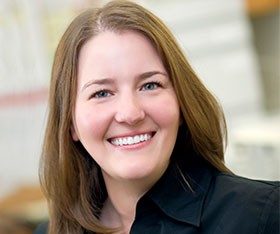Stephanie Wettstein, Ph.D.

Stephanie Wettstein
Assistant Professor
Montana State University
B.S., Paper Science with a Minor in Chemistry, University of Wisconsin-Stevens Point;
M.S. and Ph.D., Chemical Engineersing, University of Colorado, Boulder
When Stephanie finished her B.S. (major: paper science, minor: chemistry), she transitioned to industry. At first the learning curve in industry was steep, as she liked it! She was volunteering to mentor new hires and was taking professional development courses. As a process engineer she was problem-solving and continuously working on new projects, but after the first 2 years, she felt that she wasn’t learning as much as she wanted.
So she decided to go back to school—permanently. “I felt that as a Professor there would be no end to my learning,” Wettstein says. “There are always new classes to teach, papers to read, and students to teach.” She earned her Ph.D. in Chemical Engineering (zeolite separations), completed a 2-year postdoc (renewable chemicals from biomass), and found a position an assistant professor.
Industry had its strengths: “I do miss the people I worked with in industry and the large-scale problems we would work on,” she says. But she is very happy with the rigors of academic life.
Wettstein is an assistant professor at Montana State University, leading a lab that studies the same areas she researched as a Ph.D. candidate and then postdoc.
Have confidence in yourself. It is easy to think that you do not have the skills, or think, "Why would they want to hire me?" But if you go into things confidently with a positive attitude, you will be successful!
Typical day on the job:
For a given week I spend approximately 45% of my time teaching, which includes preparing lectures, quizzes, solutions, and in class teaching; 45% of my time doing research, which includes writing grants, mentoring and training researchers, identifying grants to apply to, and writing journal articles; and 10% doing outreach, which includes reviewing journal articles, being the faculty advisor to SWE, showing demonstrations and giving lectures to elementary students and the public about chemical engineering
Work environment:
I have both an office and a lab. I am fortunate that I do not share space with others. In my lab, I have a gas chromatograph/mass spectrometry (GC/MS), liquid chromatograph/MS (LC/MS), reactors, and other standard lab equipment (e.g., balances, glassware, etc.). In my office, it is just a standard office.
Work schedule:
I work 50-60 hours/week. Overtime isn't necessarily required, but I get a lot done in that extra time! It’s a more relaxed environment since it is truly up to me what I accomplish. I am not required to travel for work, but do get the opportunity to travel to conferences and professional development workshops.
Tools you can't live without:
My PC with Office—because PowerPoint, Excel, and Word are indispensable!
Best productivity trick:
Set aside time weekly specifically for writing grants and journal articles. Writing is the first thing to fall off my list so I have to schedule time for it. A colleague of mine has set up a writing group 3 times per week where new faculty get together to write. It has really increased my productivity! I would highly recommend setting up dedicated time to accomplish tasks that are not your favorite to do.
Best career advice you’ve received:
Have confidence in yourself. It is easy to think that you do not have the skills, or think, "Why would they want to hire me?", but if you go into things confidently with a positive attitude, you will be successful! (Or at least learn something along the way!)
Skills or talents that make you a good fit for your job:
I am outgoing and motivated. As faculty, you have to be able to ask for help and seek out collaborators. Also, the time you put in to writing grants, journal articles, etc. directly benefits you (not necessarily your department head) so I have to stay motivated to keep writing.
Essential habit you wish you'd started earlier:
Exercising regularly. It is important to reduce the stress in your life and gives you time to think about things.
Favorite ACS resource:
The conferences. They are great networking tools in addition to being great sources of research.

